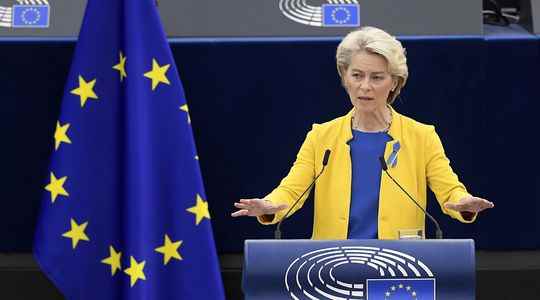The European Commission wants to tax superprofits. This is one of the main lessons of Ursula von der Leyen’s speech on the state of the European Union, this Wednesday, September 14. During this traditional back-to-school meeting at the European Parliament, the President of the Commission was eagerly awaited. The former German Defense Minister presented the main proposals emanating from the various European Heads of State and their Energy Ministers in order to contain the explosion of electricity bills. Observers fear the prospect of a winter where cuts would be frequent. France has promised that there will be no blackouts on its soil, other EU states must face a more critical situation.
The European Commission intends to act and Ursula von der Leyen focused her back-to-school speech on this burning issue. Brussels insists on demanding “a temporary solidarity contribution” from producers and distributors of gas, coal and oil, who are making massive profits thanks to soaring prices. “These large companies must therefore pay a fair share, pay a crisis contribution,” explained Ursula von der Leyen.
According to the project consulted by AFP, the contribution would be set at 33% of superprofits, i.e. profits more than 20% higher than the average for the years 2019-2021. It also plans to cap the income of electricity producers, from nuclear and renewable sources, which accumulate extraordinary profits by marketing their energy at a price far exceeding the cost of production. The commission proposes to set this ceiling at €180/megawatt hour. Coal and methane are excluded from the mechanism.
140 billion euros in cash
If the surge in prices is so great, it is above all linked to the principle of the “marginal blow”, structuring the European energy market, which consists in taking as a reference the price of the highest resource and thus smoothing prices on a common benchmark across the continent. It is a major decision, inspired by the Iberian derogation granted to Portugal and Spain a few weeks ago, which breaks with the European tariff system.
The difference between the income and the wholesale market price will be recovered by the States to be distributed to households and businesses. According to forecasts by Ursula von der Leyen, the entry of this device will make it possible to raise “more than 140 billion euros”. An in-depth reform of the European electricity market is looming.
Russian gas spared
Although the idea of capping the income of nuclear and renewable electricity producers was adopted, the Commission has given up on a similar operation concerning the price of gas. European executives had, for a time, considered setting a limit on the price paid to Russia for its gas deliveries, with the prospect of further drying up the Kremlin’s finances. An initiative strongly opposed by Eastern European countries, heavily dependent on Russian gas.
Ursula von der Leyen at the same time specified that the European Union did not rule out capping the price of all gas imports to Europe, but the balance of such a decision is fragile. As various economists have pointed out, a commercial practice of this order could undermine the attractiveness of the European market, particularly with regard to suppliers of liquefied natural gas.
Objectives set
Another measure announced by the Commission: setting in stone a binding objective for each country to reduce its electricity consumption by “at least 5%” during so-called peak hours, i.e. those when electricity is most Dear. According to its president, compliance with the rate would reduce gas consumption by 3.8%. Ursula von der Leyen has also set another objective, this time indicative, of reducing monthly consumption by 10%.
Brussels has also shown itself as a support cash-strapped energy suppliers. It is planned to relax the regulatory framework and introduce anti-speculation mechanisms to deal with price volatility and limit market fluctuations. “We will modify the temporary framework for state aid measures in October, in order to allow the provision of public guarantees”, announced Ursula von der Leyen on Wednesday.
To respond to the energy crisis in a longer term perspective, the EU should create a new public bank dedicated to the development of hydrogen. The challenge ? Building “the future energy market” and being less dependent on exports. EU energy ministers are due to vote on the proposals at an extraordinary meeting on September 30 in Brussels.
